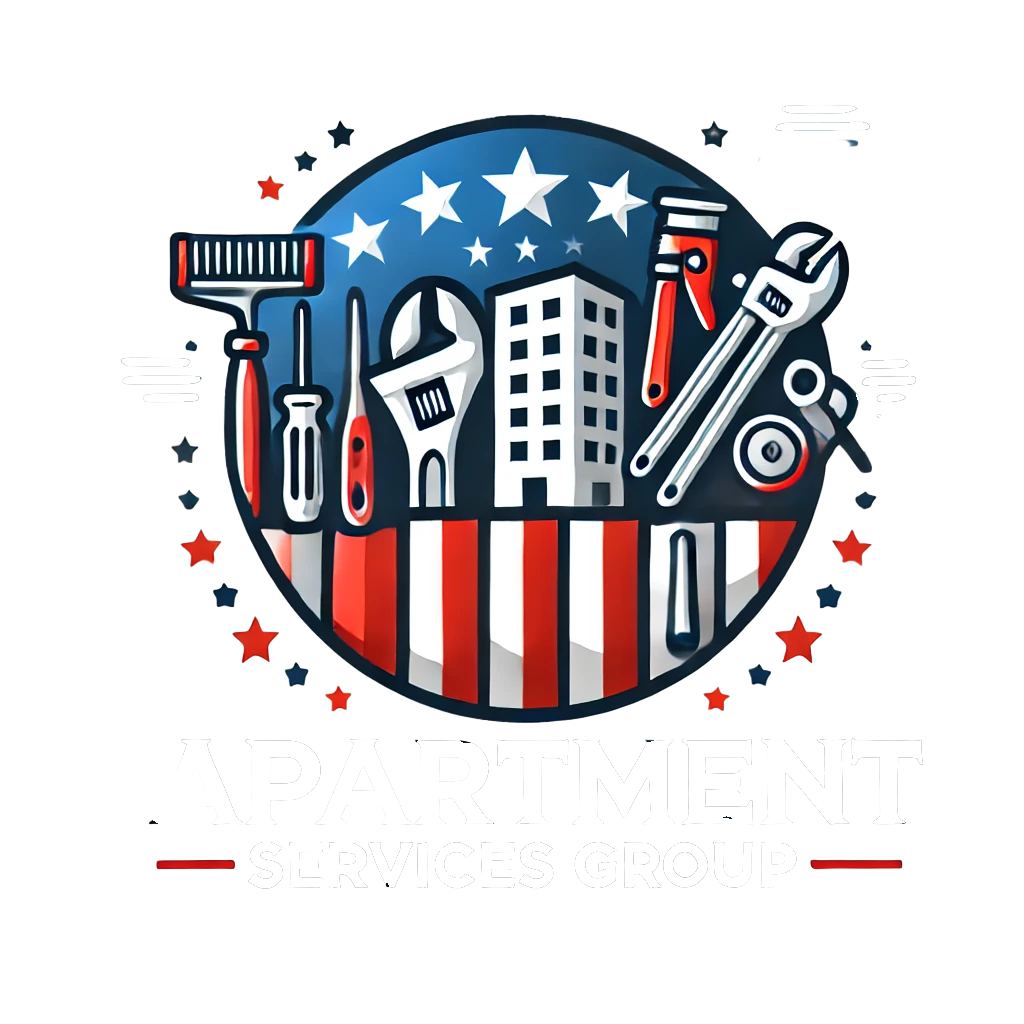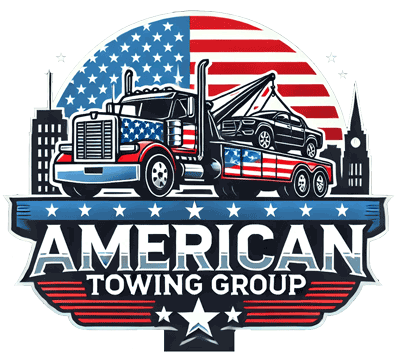Private Property Towing Houston 2025: Expert, Calm Guide
Why Private Property Towing Houston Matters for Property Success
Private property towing Houston is a critical tool for property managers and owners who need to maintain order, safety, and accessibility in their parking areas. Here’s what you need to know:
Key Facts About Private Property Towing in Houston:
- Property owners can authorize towing of unauthorized vehicles at no cost to themselves
- Towing companies must report all tows to police within 2 hours
- Proper signage is legally required before any vehicle can be towed
- Vehicle owners are responsible for all towing and storage fees
- Property owners have limited liability when using licensed, insured towing companies
Private property towing serves multiple purposes beyond just removing problem vehicles. It keeps fire lanes clear for emergency access, ensures handicap spaces remain available for those who need them, and prevents unauthorized parking that frustrates your legitimate tenants and visitors.
As one property management expert noted in our research: “It’s important that your parking lot doesn’t have any vehicles that are parked illegally or that are abandoned.” This simple statement captures why effective parking enforcement is essential for any successful property.
The process involves three main parties – the property owner who authorizes the tow, the licensed towing company that performs the service, and the vehicle owner who must pay to retrieve their car. Understanding how these relationships work helps you avoid conflicts and legal issues.
I’m Moe Shariff, owner of Apartment Services Group and several other Houston-based service companies including American Towing Group. Over eight years in business, I’ve helped countless property managers steer private property towing Houston challenges while maintaining positive tenant relationships and legal compliance.
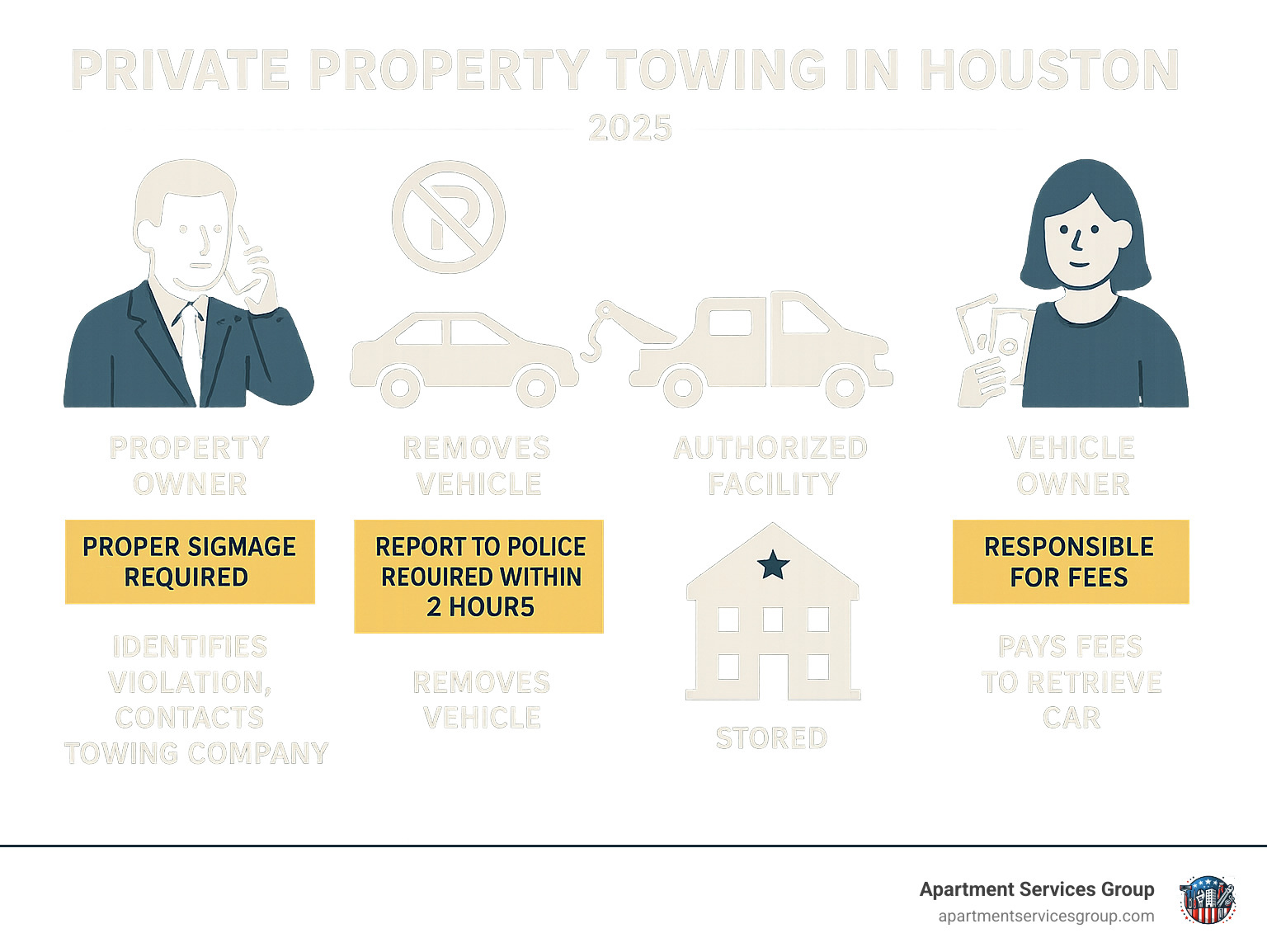
Understanding the Law: Towing from Private Property in Houston
Let’s be honest – the legal side of private property towing Houston can feel overwhelming at first. But here’s the good news: once you understand the basics, it’s actually pretty straightforward. Think of it like learning the rules of the road – they exist to keep everyone safe and protect everyone’s rights.
The foundation of everything we do comes from Texas Occupation Code Chapter 2308. This isn’t just legal jargon – it’s your roadmap to handling towing situations properly. The code covers all the important stuff: what signs you need, how towing companies must operate, and what protections you have as a property owner.
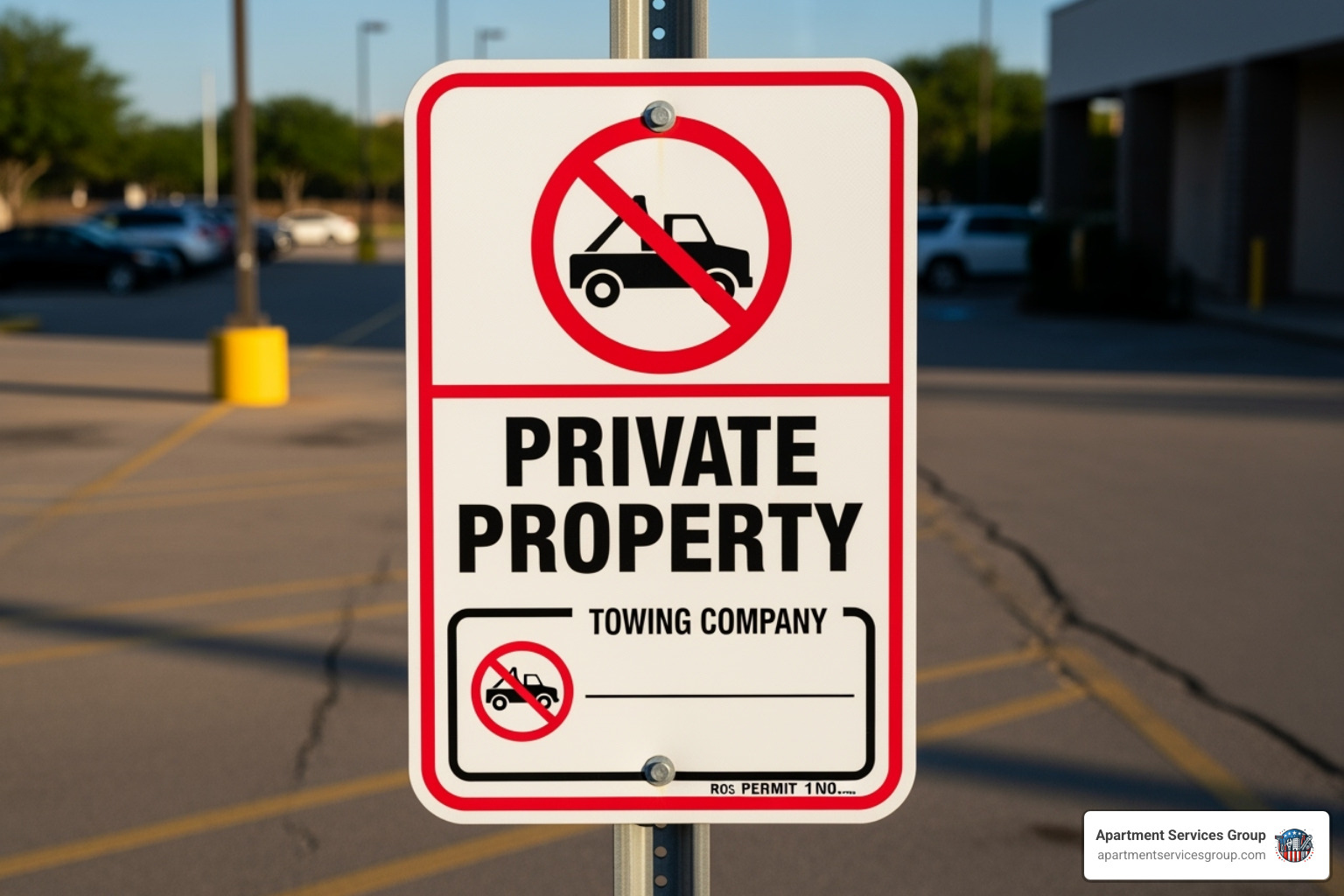
Here’s something that surprises many property managers: proper signage isn’t just recommended – it’s absolutely required. Without the right signs in the right places, any tow you authorize could be considered illegal. That’s not a risk worth taking.
The reporting requirements are pretty smart when you think about it. When a vehicle gets towed, the towing company has just two hours to report it to local police. If your property is in an unincorporated area, they report to the county sheriff instead. This creates a paper trail that helps vehicle owners find their cars quickly and reduces those angry phone calls to your office.
The vehicle storage facility (VSF) that receives the towed car also has to report to police within two hours. It’s like a double safety net – two separate reports ensure nothing falls through the cracks.
What Are the Legal Requirements for Towing?
Getting the legal requirements right isn’t complicated, but every detail matters. Miss one requirement, and you could face serious problems down the road.
Signage specifications are where most people start, and for good reason. Your signs must be at least 18×24 inches – that’s bigger than a standard sheet of paper. They need the international towing symbol (you know, that little truck with a car on the back) and clear language stating that unauthorized vehicles will be towed at the owner’s expense.
The red and white signs requirement exists for a simple reason – visibility. Texas law specifies red lettering on white background or white lettering on red background because these combinations are easiest to read, even in poor lighting conditions.
Towing company information must be crystal clear on every sign. This means the company’s name, address, and most importantly, their 24-hour phone number. That phone number requirement is strict – it must be answered by a real person, not a machine, any time of day or night.
The Texas Department of Licensing and Regulation (TDLR) oversees all towing companies and storage facilities. We always verify that our towing partners maintain current TDLR licenses and good standing. It’s like checking that your contractor has the right permits – basic due diligence that protects everyone involved.
Compliance means following through on all these requirements consistently. You can’t pick and choose which rules to follow or enforce them only sometimes. Consistency protects you legally and builds trust with your tenants.
Your Rights and Responsibilities as a Property Owner
As a property owner, you have real power to control who parks on your property. But with that power comes responsibility – and liability if you don’t handle things correctly.
Legal authorization means you must specifically approve each tow. This usually involves a written agreement with your towing company that spells out exactly when they can remove vehicles. Common triggers include unauthorized parking, abandoned vehicles, fire lane violations, and handicap space violations.
Non-consensual towing – removing someone’s car without their permission – falls under strict state regulations. The key is working with professional towing companies who understand these rules inside and out. When done right, you’re protected. When done wrong, you could face expensive lawsuits.
Avoiding conflict starts with clear communication. Good signage, consistent enforcement, and transparent policies prevent most disputes before they start. We’ve found that residents appreciate knowing the rules upfront rather than finding them the hard way.
Documentation saves you when disputes arise. We photograph every violation – the car, the violation, the surrounding signs. These photos become crucial evidence if someone challenges a tow in court.
Insured towing companies aren’t just a good idea – they’re your legal protection. Texas Occupation Code Section 2308.403 specifically states that parking facility owners aren’t liable for damages if they use properly licensed and insured towing companies. This is huge – it shifts liability away from you and onto the professionals who specialize in vehicle removal.
For apartment communities, effective parking enforcement connects directly to overall Apartment Security Houston strategies. When parking areas are well-managed, the entire property feels safer and more organized.
| Feature | Private Property Towing | Municipal Towing |
|---|---|---|
| Authority | Property owner/manager | Law enforcement or city ordinance |
| Purpose | Enforce private parking rules, remove unauthorized vehicles | Enforce public parking laws, clear accident scenes, impound vehicles |
| Initiator | Property owner/manager contracts towing company | Police officer, city official, or traffic enforcement |
| Location | Private property (apartments, businesses, HOA) | Public streets, highways, city-owned lots |
| Signage | Legally required, specific dimensions & content | May or may not be required, depends on violation |
| Cost to Initiator | Typically none (vehicle owner pays) | City/taxpayers (initially), then vehicle owner pays |
| Legal Basis | Texas Occupation Code Chapter 2308 (Private Property Towing) | Texas Transportation Code, local ordinances |
| Reporting | Required to report to local police within 2 hours | Typically reported immediately by law enforcement |
A Property Manager’s Guide to Private Property Towing in Houston
As a property manager, I’ve learned that private property towing Houston is so much more than just removing problem vehicles. It’s really about creating a safe, organized environment where your tenants actually want to live and work. When done right, towing becomes a valuable tool that improves property value and keeps residents happy.

Think about it from your tenant’s perspective. When they come home after a long day and can easily find parking, when emergency vehicles can access the property without obstruction, and when handicap spaces are available for those who need them – that speaks volumes about how well you manage the property. It shows you care about safety, convenience, and fairness.
The key is working with a professional towing service that understands this isn’t about being aggressive or punitive. It’s about maintaining order while preserving positive relationships with your community. When parking rules are enforced consistently and fairly, it actually creates a more harmonious living environment for everyone.
Common violations that typically require towing include parking in designated “no parking” zones, blocking fire lanes or emergency access points, unauthorized use of reserved spaces, blocking dumpsters or waste collection areas, handicap space violations without valid permits, obstructing traffic flow, abandoned or derelict vehicles, missing required parking permits, parking on sidewalks or landscaped areas, prohibited commercial vehicles in residential areas, and vehicles leaking fluids or posing hazards.
When to Authorize a Tow
Knowing when to pull the trigger on a tow is crucial. You want to be fair but firm, and every decision should be based on documented violations that genuinely impact safety, accessibility, or quality of life on your property.
Unauthorized parking is probably what you’ll deal with most often. This covers vehicles in spaces they shouldn’t be using or cars without the required permits. It might seem minor, but when paying residents can’t park because someone else is using their spot, frustration builds quickly.
Abandoned vehicles present a different challenge. These are cars that have been sitting for weeks or months, often looking worse for wear. Beyond being an eyesore, they take up valuable parking space and can become safety hazards. Removing them frees up space and immediately improves your property’s appearance.
Fire lane violations require immediate action. There’s no gray area here – blocking emergency access puts everyone at risk. These vehicles need to be towed right away, regardless of circumstances.
Blocked dumpsters or accessways might not seem urgent, but they disrupt essential services. When the garbage truck can’t access the dumpster or maintenance crews can’t reach utility areas, it affects everyone on the property.
Handicap space violations deserve special attention. Unauthorized parking in these spaces isn’t just inconsiderate – it’s illegal and prevents access for people who genuinely need it. We take these violations very seriously.
Expired permits and lease violations round out the common scenarios. If your property uses a permit system, expired permits need consistent enforcement. Similarly, lease-specific rules like prohibiting commercial vehicles in residential areas need to be upheld.
Effective parking enforcement, including strategic use of Property Management: Boost Tenant Satisfaction with Expert Property Management techniques, actually increases tenant satisfaction when handled professionally.
The Process for Private Property Towing in Houston
Once you’ve identified a violation, following a clear, documented process protects everyone involved and ensures legal compliance.
Contacting a towing service should be your first step after confirming the violation. Having a trusted partner makes this much smoother – you want a company that responds quickly and handles situations professionally.
Providing authorization means you or another authorized representative must explicitly approve the tow. This usually involves completing a tow authorization form that includes vehicle details, the specific violation, and location information.
Documenting the violation is absolutely critical. Before the tow truck arrives, take comprehensive photos of the vehicle, license plate, the specific violation, and any relevant signage. This photographic evidence protects you legally and helps resolve any disputes that might arise later.
Notifying the towing company with complete details – make, model, color, license plate number, and exact location – ensures they can locate and remove the right vehicle efficiently.
Ensuring compliance means your towing partner handles the removal safely and legally, including reporting the tow to police within the required two-hour window.
Our comprehensive Apartment Towing Services in Houston streamline this entire process, making it as seamless as possible while maintaining full legal compliance.
Choosing a Reputable Towing Partner
Your choice of towing company directly impacts your property’s reputation and your legal protection. The right partner makes all the difference between smooth operations and potential headaches.
Licensing and insurance verification should be your starting point. Always confirm that both the towing company and their vehicle storage facility hold current TDLR licenses and carry comprehensive liability insurance. This protects you from potential damages and ensures professional standards.
24/7 availability is non-negotiable. Parking violations happen at all hours, and you need a company that answers their phone with real people, not automated systems. When a resident calls looking for their towed vehicle at midnight, they need immediate assistance.
Professionalism shows in everything from uniformed drivers to courteous customer service. Look for companies that guarantee satisfaction and handle every interaction with respect and competence.
Real-time tracking capabilities help you provide accurate information to vehicle owners. Advanced towing companies use cloud-based systems that let you track towed vehicles and quickly answer questions from concerned residents.
Damage-free towing methods protect vehicles during removal. Reputable companies use techniques that only contact the tires, ensuring cars aren’t damaged during the towing process.
Positive reviews and industry affiliations indicate a commitment to professional standards. Companies with strong reputations often get most of their business from referrals, which speaks to consistent quality service.
For Vehicle Owners: What to Do If Your Car Is Towed
That sinking feeling when you walk to where you parked your car and find an empty space is something nobody wants to experience. But before you panic or assume the worst, take a deep breath. If your vehicle was towed from private property in Houston, there’s a clear path to getting it back.
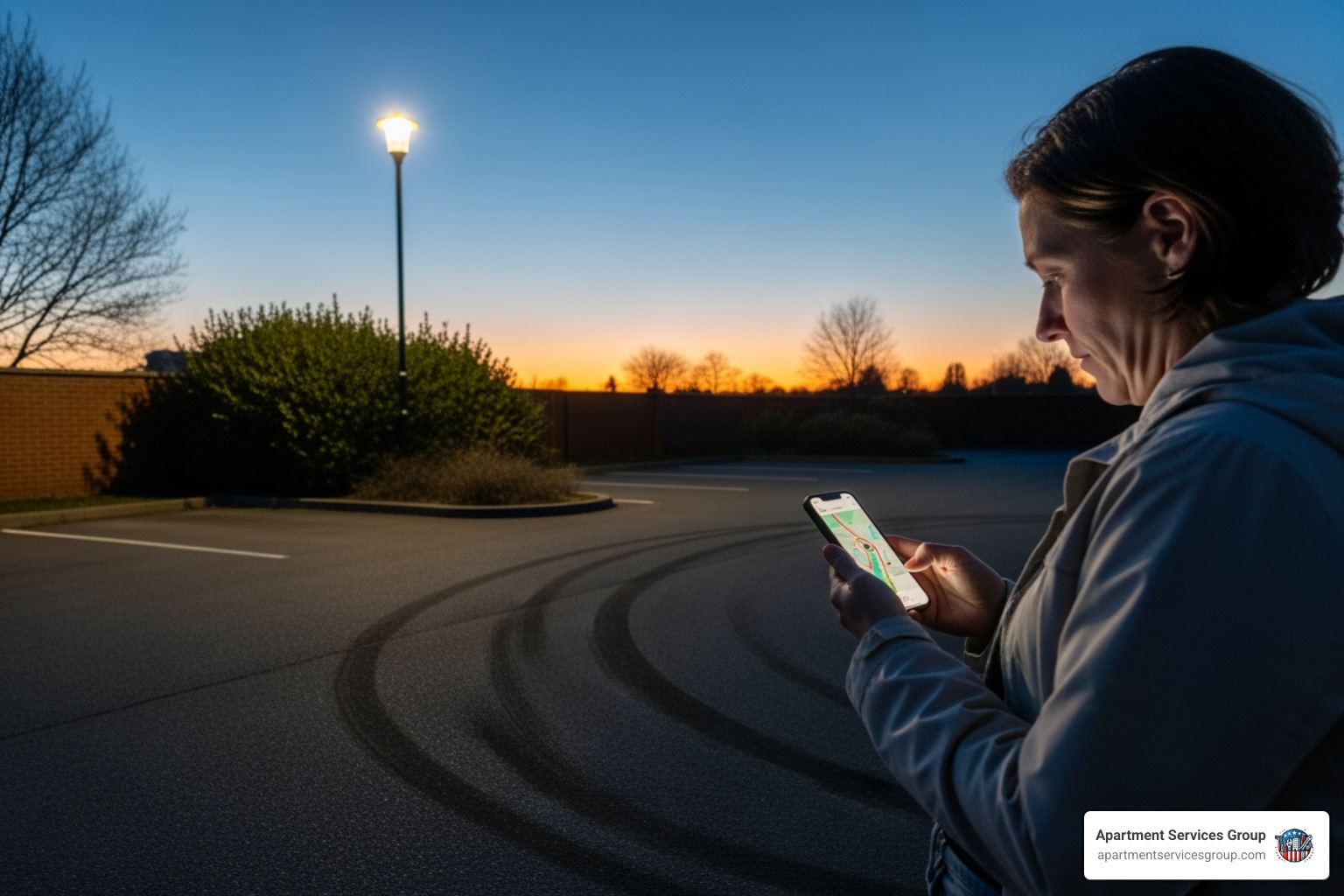
Your car hasn’t vanished into thin air. When private property towing Houston companies remove vehicles, they’re required by law to follow specific procedures that create a paper trail. This means your vehicle is sitting at a licensed storage facility, waiting for you to come get it.
The key is staying calm and knowing your next steps. Every legitimate tow creates documentation, and you have legal rights throughout this process. Whether you were parked somewhere you shouldn’t have been or believe the tow was a mistake, understanding the system will help you steer it smoothly.
How to Find Your Towed Vehicle
Your first mission is detective work – finding where your car ended up. The good news is that Texas law requires multiple reporting systems, so your vehicle should be traceable through several channels.
Start with the property manager if you know where your car was towed from. Whether it was an apartment complex, shopping center, or office building, the property management should have records of which towing company they use. They can point you in the right direction immediately.
Check the posted signs at the location where you parked. Texas law requires clear signage that includes the towing company’s name and 24-hour phone number. These signs aren’t just suggestions – they’re legal requirements. If you can find them, you’ll have the direct contact information you need.
Call the non-emergency police number for your area. All private property tows must be reported to local police within two hours. For Houston, contact the Houston Police Department’s non-emergency line. If your car was towed from outside the city limits in Harris County, call the Harris County Sheriff’s Office instead. Have your license plate number, vehicle description, and the location where it was parked ready.
Try online search tools like Find your towed vehicle. Many of these databases connect to the official reporting systems and can help you locate your car using just your license plate number or VIN.
Once you’ve tracked down your vehicle, the storage facility will explain their retrieval process, including what fees you’ll need to pay and what payment methods they accept.
Your Rights with Private Property Towing in Houston
Even if your car was legally towed, you’re not powerless in this situation. Texas law protects vehicle owners with several important rights that towing companies must respect.
You can access your personal belongings without paying any fees during normal business hours. If you left your wallet, medication, or other essential items in the car, you don’t have to pay the full towing and storage fees just to get them back.
You’re entitled to an itemized bill that breaks down every charge. Towing fees, daily storage costs, and any additional charges must be clearly listed. These fees are regulated by the Texas Department of Licensing and Regulation, so there are legal limits on what companies can charge.
Payment options must include credit cards. While some smaller operations might prefer cash, state law generally requires facilities to accept major credit cards. They can’t hold your car hostage just because you don’t have exact change.
You can dispute the tow if something seems wrong. Maybe the signs weren’t posted correctly, or you believe you were parked legally. You can file a complaint with the TDLR or take the matter to Justice of the Peace court. Document everything – take photos of the location, keep all receipts, and save any communication with the property owner or towing company.
If you suspect illegal towing, act quickly to protect your rights. Document the scene with photos, verify whether the tow was properly reported to police, and file a complaint with the TDLR. Illegal towing does happen, and there are consequences for companies that don’t follow the rules.
The process might be frustrating, but legitimate towing companies want to resolve these situations professionally. Most vehicle recoveries go smoothly once you understand the system and know what to expect.
Modernizing Parking Management with Technology
The days of clipboard-wielding property managers and faded paper permits stuck to windshields are quickly becoming a thing of the past. Technology is revolutionizing how we handle private property towing Houston and parking management overall, making life easier for everyone involved.
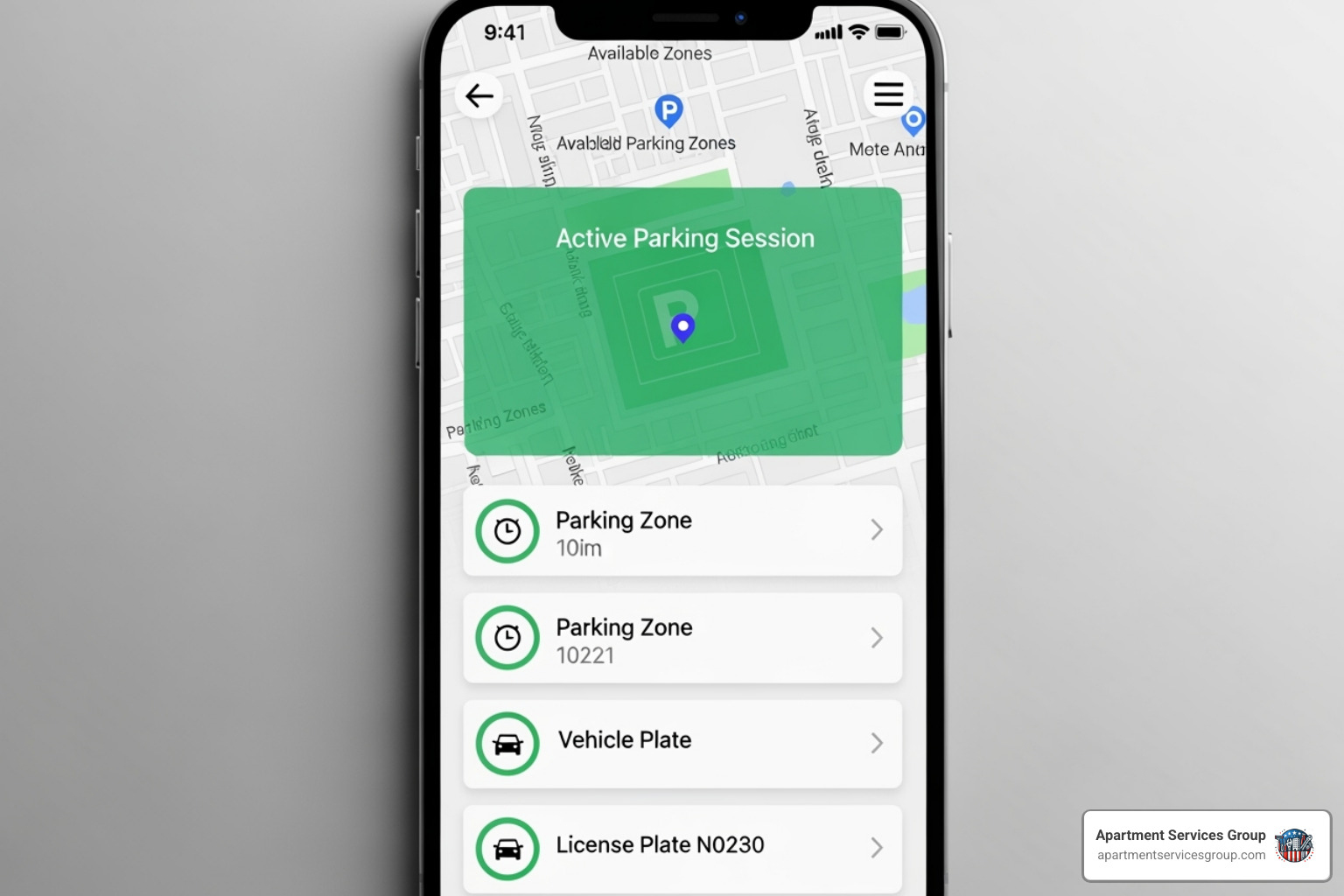
We’ve witnessed how digital solutions transform parking headaches into smooth operations. Take the Smart Parking App, which serves over 120,000 residents across the US. This isn’t just about being trendy with technology – it’s about creating real solutions that reduce conflicts and make parking management actually work.
The beauty of modern parking technology lies in its simplicity. Instead of residents scrambling to find guest passes or property managers dealing with endless phone calls about parking permits, everything happens seamlessly through digital platforms. Cloud-based management systems handle the heavy lifting, while virtual parking systems keep everyone organized and informed.
What excites me most about these technological advances is how they reduce the stress around parking enforcement. When systems are transparent and easy to use, residents feel more in control, and property managers can focus on bigger picture issues rather than constantly putting out parking-related fires.
How Technology Streamlines Parking Enforcement
The integration of smart parking solutions creates a ripple effect of improvements throughout your property management operations. Virtual parking permits eliminate the hassle of physical passes that fade, fall off, or get lost. Residents can manage their permits digitally, update guest information instantly, and never worry about forgetting to display their pass.
Real-time monitoring capabilities mean property managers can spot unauthorized vehicles quickly, often before they become a major issue. This proactive approach prevents the buildup of parking problems that traditionally led to resident complaints and emergency towing situations.
The automated violation reporting feature is particularly valuable. Security personnel or residents can snap a photo and submit a violation report through an app in seconds. This documentation creates a clear paper trail and speeds up the decision-making process for when towing becomes necessary.
Improved communication flows naturally from these digital systems. Residents receive instant notifications about parking policies, guest registration confirmations, and any enforcement actions. Towing companies get real-time authorization and can provide immediate updates when vehicles are removed. This transparency reduces confusion and builds trust within the community.
From a security standpoint, digital parking management provides improved oversight of who’s coming and going from your property. This visibility helps deter unauthorized access and creates a safer environment for legitimate residents and visitors.
At Apartment Services Group, we’ve seen how technology integration amplifies the effectiveness of our Apartment Building Management Software. When parking management works seamlessly with other property operations, the entire resident experience improves dramatically.
The future of parking enforcement isn’t about catching people making mistakes – it’s about creating systems so clear and user-friendly that violations rarely happen in the first place. That’s the kind of proactive management that builds lasting tenant satisfaction and property value.
Frequently Asked Questions about Private Property Towing
We get the same questions about private property towing Houston almost every week from property managers and vehicle owners alike. Let me clear up the confusion with straightforward answers based on our years of experience in the Houston market.
Is it free for a property owner to have a car towed in Houston?
Here’s some good news for property managers – yes, it’s typically completely free for you to have an unauthorized vehicle towed from your private property in Houston. The vehicle owner is responsible for all towing and storage costs, not you.
This arrangement makes perfect sense when you think about it. Why should you pay to remove someone else’s illegally parked car? The person who created the problem by parking without permission should handle the financial consequences.
There’s one small exception worth noting: junk car removal situations where the vehicle has no value and the owner can’t be located. In these rare cases, some towing companies might charge a nominal fee for expedited removal, but this is usually minimal and only applies to truly abandoned, worthless vehicles.
For standard parking violations – someone parked in your fire lane, blocking a dumpster, or using a handicap space without authorization – the tow costs nothing for you as the property manager.
What types of vehicles can be towed from private property?
The simple answer is: almost any vehicle that’s violating your posted parking rules can be towed. We’ve handled tows for everything from compact cars to large RVs over the years.
Common vehicles we see towed include standard cars, pickup trucks, SUVs, and motorcycles. But it doesn’t stop there. Commercial vehicles parked in residential areas (when prohibited), RVs taking up multiple spaces or violating size restrictions, and inoperable vehicles that appear abandoned can all be candidates for towing.
The key requirement isn’t the type of vehicle – it’s whether that vehicle is violating clearly posted rules or creating a safety hazard. A motorcycle blocking a fire lane gets towed just as quickly as a pickup truck in the same spot.
Abandoned vehicles present a special category. These are cars, trucks, or other vehicles left on your property for extended periods without any sign of owner activity. They’re often inoperable, missing parts, or clearly neglected. Removing these improves your property’s appearance and frees up valuable parking spaces for legitimate users.
How much can a towing company charge in Houston?
Vehicle owners often worry about getting hit with outrageous fees, but there’s good news here too. The Texas Department of Licensing and Regulation (TDLR) regulates these fees to prevent price gouging and ensure fairness.
The main charges vehicle owners can expect include a tow fee for the actual removal service, daily storage fees that accumulate while the vehicle sits at the storage facility, and an impoundment fee for processing the vehicle into the lot.
Some facilities also charge notification fees if they send certified letters to inform the vehicle owner about the tow. All of these fees have maximum rates set by TDLR – towing companies can’t just make up whatever numbers they want.
Here’s what protects vehicle owners: they have the right to receive an itemized bill showing exactly what they’re being charged for, and storage facilities must accept major credit cards for payment. No cash-only demands that leave people stranded.
As property managers, we make sure our towing partners stick strictly to these regulated rates. It’s not just about legal compliance – it’s about maintaining ethical practices that reflect well on our properties and reduce conflicts with residents.
Conclusion
Managing private property towing Houston doesn’t have to feel like walking through a legal minefield. With the right approach, it becomes a powerful tool that actually makes life better for everyone involved – property managers, residents, and even the occasional vehicle owner who finds themselves on the wrong side of a parking violation.
Think of effective towing management as the foundation of a well-run property. When legal compliance is your starting point, everything else falls into place naturally. Those red and white signs aren’t just decorations – they’re your legal shield. Following the Texas Occupation Code requirements for signage and reporting isn’t just about avoiding penalties; it’s about building trust with your community.
The magic really happens when you find the right professional partnerships. A licensed, insured towing company that answers their phone at 2 AM with a real human voice? That’s worth its weight in gold. These partnerships protect your property’s reputation while ensuring vehicle owners are treated fairly throughout the process.
But here’s what we’ve learned after years in this business: tenant communication prevents more problems than any tow truck ever could. When residents understand the parking rules from day one, when guest registration is simple and clear, when people know exactly what to expect – that’s when parking enforcement becomes nearly invisible. The best towing policy is the one that rarely needs to be used.
Effective parking management goes far beyond just removing problem vehicles. It’s about keeping fire lanes clear for emergency responders, ensuring handicap spaces stay available for those who need them, and creating an environment where your legitimate residents and visitors can always find a spot. When done right, it actually boosts tenant satisfaction rather than creating conflicts.
The future belongs to properties that accept technology. Smart parking apps, digital permits, and cloud-based management systems aren’t just fancy gadgets – they’re game-changers. They reduce conflicts, streamline enforcement, and make life easier for everyone involved. Why deal with faded paper permits when you can manage everything digitally?
At Apartment Services Group, we’ve spent years perfecting this balance. Located at 16420 Park Ten Place, Ste #590, Houston, TX 77084, we understand that parking management is just one piece of creating an exceptional living experience. Our approach integrates towing services with comprehensive property management, ensuring every aspect of your property works together seamlessly.
When residents see that rules are enforced fairly and consistently, when emergency access stays clear, when parking actually works the way it should – that’s when properties truly shine. It’s not about being the “towing police.” It’s about creating a community where everyone can thrive.
Ready to transform your property’s parking challenges into a competitive advantage? Explore comprehensive apartment complex solutions and find how our unparalleled expertise can create a seamless, transformative living experience for your residents.


